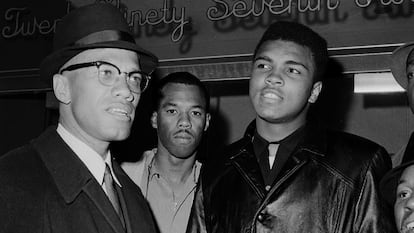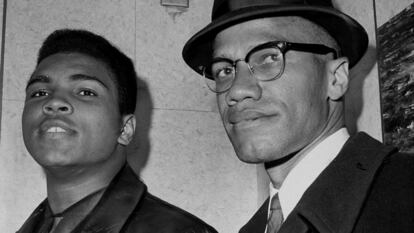When Malcolm X and Cassius Clay anticipated present-day racism in the US
Actress Regina King, the queen of television, makes her debut as a film director with ‘One night in Miami’. “America will not be great again while it keeps murdering its citizens”, she says

On February 25, 1964, Cassius Clay, only 22 years old at the time, surprisingly became the heavyweight boxing champion of the world when he defeated Sonny Liston in Miami. Liston, the title holder, was a hard-hitting, iron-fisted fighter. Clay had class, style and a big sassy mouth. But he was also a man conscious of his influence and destiny. His friend Malcolm X attended the pugilistic soirée and invited the brand-new champion to his motel room that night: Clay was about to announce his conversion to Islam, his name change (to that of Muhammad Ali, the one beloved by God), and his joining the Nation of Islam, the religious organization that Malcolm X, incidentally, was planning to leave. That night, in that tiny room, they were not alone, they were joined in the celebration by two other friends who were also stars in their own right: the singer Sam Cooke, the soul music icon, and Jim Brown, the legendary running back, who, at the top of his game but fed up with racism in sports, was thinking about retiring and taking a go at an acting career.
There is no photographic evidence of the night in question: actually, there is not even a single snapshot of the four of them together. Neither does anyone know what they talked about. What we do know is that after that night and the early hours of the next day, the four of them changed their lives and their careers. Sam Cooke was murdered 10 months later, in a shady accident that time has shrouded in a conspiratorial halo. Weeks later, in February 1965, Malcolm X was also murdered. The sixties were a cauldron seething with violence, civil rights and art.
During the confinement, Regina King (50 years old, born in Los Angeles) was astounded by the parallel echoes between what we were experiencing at the time (“The murders of George Floyd and Breonna Taylor talk to us about the racism extant in my country”), and One night in Miami, the movie she made about the foursome in question (“They are some kind of Black Avengers, aren’t they?”) just before the onset of the pandemic. The movie is said to be an Oscar contender. It is Monday in Los Angeles, and King appears on the Zoom screen. The first thing that strikes me are her hazel eyes, even more noticeable in the aseptic room in which the interview takes place. King’s resumé is impressive. After a 35-year acting career, she is one of the TV queens of her country, having won four Emmys: a pair of them for the American Crime series and two for Seven Seconds and Watchmen. Besides, she has won a Golden Globe and Oscar for her work in If Beale Street Could Talk. She had directed several TV series’ episodes in preparation for her next step: “I am well aware of the change this means for my career. I am now a movie director, and even though I used to be one for television, I must admit that, five days away from the release of my movie, I’m getting more and more nervous.” The release, through the Amazon Prime Video platform, is due this Friday, King’s 50th birthday. She will celebrate it by “having a private screening with some friends, taking every precaution and following all the anti-COVID protocols.”
The actress’s rise to stardom seemed to be obvious from her birth. Her parents named her Regina [which means queen in Latin], and her sister’s name is Reina (“queen” in Spanish), which combined with the family’s surname does sound very monarchic. While she started working in the TV industry in 1985, she did not go into movies until six years later, mentored by the late John Singleton (she made three films with him) in Boyz n the Hood. “I was blessed with the opportunity to participate in those projects and with John’s friendship for two decades, which was out of the ordinary. He allowed me to learn from the preparation previous to shooting a film, an in depth process, and from how he wished to express and how. At the time, I was not conscious of the fact that I would also be directing someday, but the universe always has a plan (laughs).”

Searching for the perfect material
King would not be satisfied with any ordinary script, which explains the time she took tracking the right material. “Because I knew just how important this step was, I worked alongside my agent for a long time looking for a script that would fulfill several expectations. I found it all in One night in Miami: it was powerful and at the same time it would allow me to express myself as an artist. And each day, during the creative process, I became more and more excited about it. I’m not saying that what I had previously directed for TV wasn’t important, but the main subject of the movie is (she thinks it over for a few seconds) valuable. And urgent.”
One night in Miami is based on a play by Kemp Powers (the co-director of the Pixar movie Soul). Kemp himself adapted it for the screen. The plot is twofold: inside the celebration night there is also a night of reflection. “Just as it is happening now, isn’t it? Biden won, but nevertheless we still have many structural problems. Our social system has to be rebuilt itself, and that does not happen automatically. Furthermore, we have seen how the last four years have destroyed the efforts of decades. I try to remain optimistic [she laughs] but my expectations are very low.” Even so, King acknowledges that every dramatic event that has taken place in the USA after the shooting of her film heightens the relevance of her movie. “It is necessary to remind each and every American citizen that there are more things that unite us than things that divide us, that we have a long past history in common, and that we effectively harbor many negative traits. If we accept that, we can improve. This is not going to make America great again (King is making fun of Trump’s slogan), what we must understand is that it was never really great, and that it will not be so if human beings and fellow Americans are still being oppressed, marginalized and murdered.”
There is a scene in the film in which Sam Cooke is outraged by Malcolm X, who tells him to his face that the songs of Bob Dylan seem to better reflect the suffering of Black Americans than his own. Cooke, who had just recorded the awesome and moving song A Change is Gonna Come, answers: “I will not be anybody’s weapon.” And what about Regina King? Has she always spoken for herself in her multiple statements committing to, for example, having women make up 50% of the cast/team in her projects, or underlining the endemic racism in the USA? “Sometimes you feel that, as a famous person, you have to live up to certain expectations. Handling these situations is complicated. Overcoming those issues and knowing that your feelings as a human being go beyond ‘what a star is supposed to say’ is not easy at all. Anyway, remember that the universe always has a plan.”
On the big screen or on the small screen
The road traveled by ‘One night in Miami’ has been a long one. The shooting process was completed with a few extra days once the coronavirus had already reached the USA. The film’s premiere at the Venice International Film Festival turned Regina King into the first Black filmmaker to be nominated for the Golden Lion prize. That journey ends today with the film’s release on Amazon. “I made the movie thinking, evidently, about releasing it in movie theaters. But these are the times we live in. And after what we have suffered during the last months in the USA, it seems utterly important to me for the movie to reach the largest possible audience. Would I like to watch it in a theater surrounded by a crowd? Yes, and I would love the audience and myself to be moved by it at the same time. Will I now be able to reach many more Americans? Of course, and the main theme of my movie deserves it.”
Have you heard our Spanish news podcast ¿Qué? Each week we try to explain the curious, the under-reported and sometimes simply bizarre news stories that are often in the headlines in Spain.
Tu suscripción se está usando en otro dispositivo
¿Quieres añadir otro usuario a tu suscripción?
Si continúas leyendo en este dispositivo, no se podrá leer en el otro.
FlechaTu suscripción se está usando en otro dispositivo y solo puedes acceder a EL PAÍS desde un dispositivo a la vez.
Si quieres compartir tu cuenta, cambia tu suscripción a la modalidad Premium, así podrás añadir otro usuario. Cada uno accederá con su propia cuenta de email, lo que os permitirá personalizar vuestra experiencia en EL PAÍS.
¿Tienes una suscripción de empresa? Accede aquí para contratar más cuentas.
En el caso de no saber quién está usando tu cuenta, te recomendamos cambiar tu contraseña aquí.
Si decides continuar compartiendo tu cuenta, este mensaje se mostrará en tu dispositivo y en el de la otra persona que está usando tu cuenta de forma indefinida, afectando a tu experiencia de lectura. Puedes consultar aquí los términos y condiciones de la suscripción digital.









































